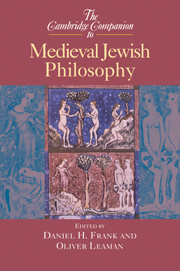Book contents
- Frontmatter
- PART I BACKGROUND AND CONTEXT
- 1 Introduction to the study of medieval Jewish philosophy
- 2 The biblical and rabbinic background to medieval Jewish philosophy
- 3 The Islamic context of medieval Jewish philosophy
- PART II IDEAS, WORKS, AND WRITERS
- PART III THE LATER YEARS
- Guide to further reading in English
- Index
1 - Introduction to the study of medieval Jewish philosophy
from PART I - BACKGROUND AND CONTEXT
Published online by Cambridge University Press: 28 May 2006
- Frontmatter
- PART I BACKGROUND AND CONTEXT
- 1 Introduction to the study of medieval Jewish philosophy
- 2 The biblical and rabbinic background to medieval Jewish philosophy
- 3 The Islamic context of medieval Jewish philosophy
- PART II IDEAS, WORKS, AND WRITERS
- PART III THE LATER YEARS
- Guide to further reading in English
- Index
Summary
Philosophers sometimes argue that there are particular expressions that are so frequently fought over that they are best characterized as “essentially contested concepts.” The concept of Jewish philosophy is just such a concept. There has always been a lot of controversy about what it is, and whether it is anything at all. This is not a problem for Jewish philosophy alone, of course, but affects all philosophies that are described in religious and ethnic terms, and familiar issues of definition then enter the discussion. Is Jewish philosophy philosophy by Jews? That is not such a simple question either, since the whole issue of who is a Jew is complex, and although at the time of the Third Reich the Nazis thought they had a neat definition of the Jewish race, we would probably hesitate to call Catholic priests Jewish thinkers merely on the basis of the fact that they had one Jewish grandparent. On the other hand, it would be wrong to define as a Jewish philosopher only those Jews who had a commitment to Judaism itself, since we know that many people feel themselves to be Jewish and are ethnically Jewish without sharing any religious beliefs at all with their more observant coreligionists. Yet they may have interesting views on religion and philosophy and it seems wrong to disqualify their work as potentially being Jewish philosophy. On the other hand, perfectly observant Jews may write on topics in philosophy that have nothing to do with Judaism, and it would be strange to classify what they do as Jewish philosophy.We seem to be getting back to the idea of Jewish science, a doctrine popular with racists but without much to be said for it otherwise.
- Type
- Chapter
- Information
- Publisher: Cambridge University PressPrint publication year: 2003
- 1
- Cited by



